高考英语《流行话题 语境识词4500》Unit 71 Escape Valve素材
高考英语《流行话题 语境识词4500》Unit 79 Rebel Wild Rose素材
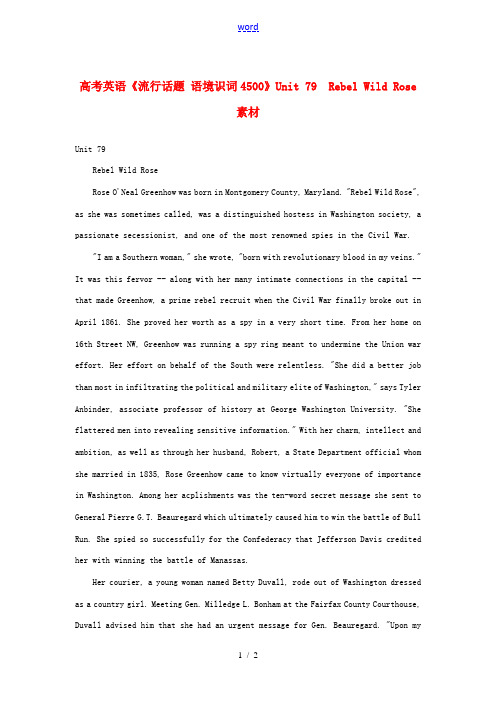
高考英语《流行话题语境识词4500》Unit 79 Rebel Wild Rose素材Unit 79Rebel Wild RoseRose O'Neal Greenhow was born in Montgomery County, Maryland. "Rebel Wild Rose", as she was sometimes called, was a distinguished hostess in Washington society, a passionate secessionist, and one of the most renowned spies in the Civil War."I am a Southern woman," she wrote, "born with revolutionary blood in my veins." It was this fervor -- along with her many intimate connections in the capital -- that made Greenhow, a prime rebel recruit when the Civil War finally broke out in April 1861. She proved her worth as a spy in a very short time. From her home on 16th Street NW, Greenhow was running a spy ring meant to undermine the Union war effort. Her effort on behalf of the South were relentless. "She did a better job than most in infiltrating the political and military elite of Washington," says Tyler Anbinder, associate professor of history at George Washington University. "She flattered men into revealing sensitive information." With her charm, intellect and ambition, as well as through her husband, Robert, a State Department official whom she married in 1835, Rose Greenhow came to know virtually everyone of importance in Washington. Among her acplishments was the ten-word secret message she sent to General Pierre G.T. Beauregard which ultimately caused him to win the battle of Bull Run. She spied so successfully for the Confederacy that Jefferson Davis credited her with winning the battle of Manassas.Her courier, a young woman named Betty Duvall, rode out of Washington dressed as a country girl. Meeting Gen. Milledge L. Bonham at the Fairfax County Courthouse, Duvall advised him that she had an urgent message for Gen. Beauregard. "Upon myannouncing that I would have it faithfully forwarded at once," Bonham later recalled, "she took out her tucking b and left fall the longest and most beautiful roll of hari I have ever seen. She took from the back of her head, where it had been safely tied, a small package, not larger than a silver dollar, sewed up in silk."Washington has seen plenty of covert operatives, as well as highly connected grand dames, but Greenhow managed to unite the two professions in herself. Indeed Greenhow's covert activities did attract unfavorable attention in Washington. She was imprisoned for her efforts first in her own home and then in the Old Capital Prison. Despite her confinement, Greenhow continued getting messages to the Confederacy by means of cryptic notes which traveled in unlikely places such as the inside of a woman's bun of hair. After her second prison term, she was exiled to the Confederate states where she was received warmly by President Jefferson Davis.Her next mission was to tour Britain and France as a propagandist for the Confederate cause. Two months after her arrival in London, her memoirs were published and enjoyed a wide sale throughout the British Isles. In Europe, Greenhow found a strong sympathy for the South, especially among the ruling classes. In 1864, after a year abroad, she boarded the Condor, a British blockade-runner which was to take her home. Just before reaching her destination, the vessel ran aground at the mouth of the Cape Fear River near Wilmington, North Carolina. In order to avoid the Union gunboat that pursued her ship, Rose fled in a rowboat, but never made it to shore. Her little boat capsized and she was dragged down by the weight of the gold she received in royalties for her book.In October 1864, Rose was buried with full military honors in the Oakdale Cemetery in Wilmington. Her coffin was wrapped in the Confederate flag and carried by Confederate troops. The marker for her grave, a marble cross, bears the epitaph, "Mrs. Rose O'N. Greenhow, a bearer of dispatches to the Confederate Government."。
高考英语《流行话题 语境识词4500》Unit 63 E-commerce, the Small B
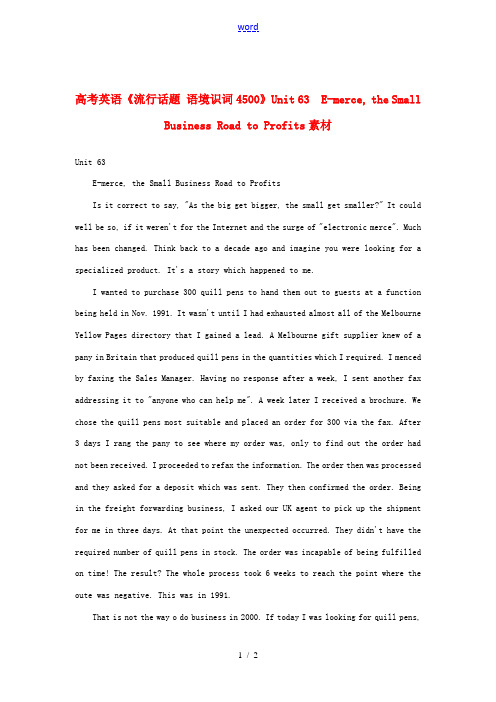
高考英语《流行话题语境识词4500》Unit 63 E-merce, the SmallBusiness Road to Profits素材Unit 63E-merce, the Small Business Road to ProfitsIs it correct to say, "As the big get bigger, the small get smaller?" It could well be so, if it weren't for the Internet and the surge of "electronic merce". Much has been changed. Think back to a decade ago and imagine you were looking for a specialized product. It's a story which happened to me.I wanted to purchase 300 quill pens to hand them out to guests at a function being held in Nov. 1991. It wasn't until I had exhausted almost all of the Melbourne Yellow Pages directory that I gained a lead. A Melbourne gift supplier knew of a pany in Britain that produced quill pens in the quantities which I required. I menced by faxing the Sales Manager. Having no response after a week, I sent another fax addressing it to "anyone who can help me". A week later I received a brochure. We chose the quill pens most suitable and placed an order for 300 via the fax. After 3 days I rang the pany to see where my order was, only to find out the order had not been received. I proceeded to refax the information. The order then was processed and they asked for a deposit which was sent. They then confirmed the order. Being in the freight forwarding business, I asked our UK agent to pick up the shipment for me in three days. At that point the unexpected occurred. They didn't have the required number of quill pens in stock. The order was incapable of being fulfilled on time! The result? The whole process took 6 weeks to reach the point where the oute was negative. This was in 1991.That is not the way o do business in 2000. If today I was looking for quill pens,I would go straight to the Internet. There I would find numerous suppliers of quill pens and be able to see clear pictures, examine prices, know when and how the product could be delivered, and order and pay for it. Today suppliers pete by their web pages and have opened up the whole world to their products.E-merce helps small businesses pete in the world market, against multinational organizations. Businesses, no matter how small, bee virtual organizations and can give the same information as though all the ponents of manufacturing, warehousing and freight were available as in-house functions.Let's assume that my quill pen supplier in Britain is now just that -- the supplier. The customer, however, doesn't know that! The several participants in its supply chain are now the manufacturer, the marketing pany (my quill pen pany), the freight pany, the distributor and the end user. The Supply Chain can be electronically automated with the greatest of ease. It does not matter how many participants are involved, or how far and extended is the supply chain. The Internet does the rest!E-merce enables small to medium-sized businesses to usefully interact within the Supply Chain, as if they were all part of the same organizations they now have the tools to pete! All this happened in a market which, until recently, was regarded for the big players only. Overall it brings petitiveness and greater profitability.。
高考英语《流行话题 语境识词4500》Unit 77 A Phenomenal Memory素材

高考英语《流行话题语境识词4500》Unit 77 A Phenomenal Memory素材Unit 77A Phenomenal MemoryI have a phenomenal memory for faces. There is no doubt about that. The only snag is that I can never remember the names that go with them. Only the other day, I raised my hat to one fellow, quite distinguished-looking he was, and I thought: "My bank manager ... my broker?" I had to go and ask him. "I'm Rankin, your next-door neighbor, Mr. Peabody," he said, r ather acidly. It was through my awful memory for names that something unpleasant happened to me not long ago.It was a Friday evening and I was in the train on my way home. It was not my regular train,for I had been kept late at work, and when it got to Ruislip, three stops before mine, there were only two of us in the compartment. I could tell straight away he was an Oxbridge man. I'm an Oxbridge man, and I had definitely seen this fellow's face there. But his name completely eluded me. It was most irritating. Who was he? I thought he might be one of the newcomers to the p retty little estate recently completed near to where I live.I am not shy, so I began to talk in a very chatty manner. He was somewhat uncommunicative andc ertainly gave nothing away. I can see that he was rather worn out, as if he had had a bad day, and I put his reluctance to talk down to this."Is this your regular train?" I asked, hopefully. It usually works in my experience. "Not often,"he said. That was all. Well, that certainly told me a lot. I started to complain about railways, then the hooliganism at football matches, inflation and a host of other topic. He only said "yes"or "no" now a nd then. Even my comment on the weather had no effect. I told him quite a lot about myself, how my ship ha d come that day, a friend had repaid me $200 in cash and many other details.He showed a flicker of interest, nothing more. I thought what a bore this fellow must be, and inthe end I gave up. I opened my paper, and when next I glanced at him, he had fallen asleep.As we were coming into Oxbridge, he was still snoozing. I gave him a pat. "Oxbridge, old chap." "Thanks," he said with a smile. Outside the station it was raining and the wind was blowing hard.It was freezing cold, too."Listen," I said to him, "why don't I give you a lift home if you live on the new estate?" "I'd appreciate that very much," he replied. I fetched my car from the parking lot and he got in with "Many hanks". He said no more till we were well across the heath. Then, all of a sudden, he turnedto me and said, "OK. Pull up here.""Here?" I queried. There as not a house in the sight; and the weather was shocking. Anyway,I pulled up. The only thing I could remember after that was something striking down hard on my head.I passed out. When I came to, I was lying on the ground, soaked to the skin, my head pounding, mycar gone and my pockets empty.I staggered int o the police station to make a report. There was a light shining on the station wall and there, lit up, w as a picture of my attacker. I had walked past it for the last seven days.I knew I had seen the face before. He was wanted by the police for armed robbery. I thanked my lucky stars it was not for murder. I looked at the name underneath the face, the face I will never forget.It was -- er -- it was -- oh, dear! I can never remember n ames.1 / 1。
高考英语《流行话题 语境识词4500》Unit 90 Virtual Grave素材

高考英语《流行话题语境识词4500》Unit 90 Virtual Grave素材Unit 90Virtual GravePeople are mortal. The bodies in which we live our real existence simply have a restricted life span. Ultimately we all die of old age, or sooner of an illness or accident. When one person's life ends irreversibly, it is the beginning of a period of deep mourning for the survivors, in which they try to deal with the loss of their loved one, friend, parent or child. The relatives mourn over the definitive departure of their loved one. And mostly they find this extremely difficult. More and more people explicitly look for a personal way to cope with mourning. Nowadays our North-European civilization permits us to express the feeling of dismay, of loss, of sorrow.The use of the Internet penetrates all aspects of our social life. This does not only change the way in which we work, learn and play with one another "from a distance", but also the way in which we have contact in intimate and ultimate events such as love and death. How does the use of the Internet change our funeral rites and rituals and how does it affect our ways of coping with death? The Internet can be used in three ways: to involve all survivors in the organization of the funeral ceremony: virtual funeral services; to honor the deceased in a respectful manner: virtual graves; to cope with the loss together with fellow-sufferers: virtual mourning groups.Modern people live two lives. One in the real, physical world and the other in the virtual world created by the Internet. People who are online for their work or for fun increasingly wonder what it means to die online. Survivors feel the urge to make death public. This is usually done by way of an obituary in a newspaper,the pilation of a memorial book, and by erecting a tombstone. While a memorial site in the real physical world can be very beautiful, but it can only be a one place at the same time. An online memorial site can be visited by anyone with a puter and Internet connection. The Internet, as an ideal place to announce the loss of someone we cherish and to erect a permanent memorial sign, offers some additional possibilities and alternatives.At the death of a beloved many people fantasize that the deceased finds a place somewhere on a little cloud, watching the survivors. Via the Internet this fantasy can be more or less acted out. With a personal memorial page, the deceased actually floats through space, even if it is cyberspace: "Lisa, darling, beautiful woman. Dead for a year now. Now everybody can look t you, read about, listen to you. Forever, on your own little cloud."Coping with death reveals the most crucial social processes and cultural values of a society. Virtual memorial places go beyond the borders of "modern" societies in which death is separated from daily life banishing the dead to institutional or religious enclaves, usually strongly determined by outdated rituals. In the future the virtual graveyards and memorial sites will have a more prominent position as cultural institutions that dramatically symbolize the values and norms as to what a society is or ought to be, and who her members are and what they would like to be.。
高考英语《流行话题 语境识词4500》Unit 101 Easter Day Traditions素

高考英语《流行话题语境识词4500》Unit 101 Easter DayTraditions素材Unit 101Easter Day TraditionsEaster Day is monly observed on the first Sunday after the full moon that occurs between March 22 and April 25. It is a religious holiday that memorates the resurrection of Jesus Christ three days after his death by crucifixion some 2,000 years ago. For Christians, Easter is a day of religious services and the gathering of family. In many churches Easter is preceded by a season of prayer, abstinence, and fasting. This is observed in memory of the 40 days' fast of Christ in the desert.The Easter Bunny, a popular image of the holiday, originated with the hare, an ancient symbol for the moon. According to legend, the bunny was originally a large, handsome bird belonging to Eostre, the Goddess of Spring. She changed the bird into a rabbit, which explains why the Easter bunny builds a nest and fills it with colored eggs.The egg is another popular symbol of Easter. Eggs were dyed and eaten during sprig festivals in ancient Egypt, Persia, Greece and Rome. colored eggs were not associated with Easter until the 15th century.The Easter Sunrise Service custom can be traced back to the ancient Pagan custom of weling the sun God when daytime is about to exceed the length of the nighttime. It was a time to "celebrate the return of life and reproduction to animal and plant life as well."At the feast of Eostre, an ox was sacrificed. The ox's horns became a symbol for the feast. They were carved into the ritual bread. Thus originated the "hot cross buns." The word "buns" is derived from the Saxon word "boun" which means "sacredox".Many superstitions grew out of this custom -- a cross bun kept from one Good Friday to the next was thought to bring luck, the buns were supposed to serve as a charm against shipwreck, and hanging a bun over the chimneypiece ensured that all bread baked there would be perfect. Another belief was that eating hot cross buns on Good Friday served to protect the home from fire. Today, the symbol of a symmetrical cross, marked with white icing is used to decorate the buns; the cross represents the moon, the heavenly body associated with the Goddess.The white lily, the symbol of the resurrection, is the typical Easter flower. The white lily stands for purity. Artists for centuries have pictured the angel Gabriel ing to the Virgin Mary with a spray of lilies in his hand, to announce that she is to be the mother of the Christ child. The lily is also the sign of the Resurrection. The white Madonna lily was used for years as the Easter lily. It often failed to bloom in time for Easter, however, and so Bermuda lilies were substituted.Easter Candles are sometimes lit in churches on the eve of Easter Sunday. Some believe that these can be directly linked to the Pagan customs of lighting bonfires at this time of year to wele the rebirth of the sun God.。
高考英语《流行话题 语境识词4500》Unit 67 Some Kids Are Orchids素材

高考英语《流行话题语境识词4500》Unit 67 Some Kids AreOrchids素材Unit 67Some Kids Are OrchidsMost of us think we know the kind of kid who bees a killer, and most of the time we are right. Boys mit about 85% of all youth homicides, and in those cases about 90% conform to a pattern in which the line from bad parenting and bad environment is usually clear. Through my work, I see these boys in the courtroom and in prison with depressing regularity. Their lives start with abuse, neglect and emotional deprivation at home. Add the effects of racism, poverty, and the drug and gang cultures, and it is not surprising that in a violent society like ours, damaged children bee deadly teens.But what about the other 10% of kids who kill: the boys who have loving parents and are not poor? What about smart privileged boys like Dylan Klebold and Eric Harris who killed over a dozen schoolmates in Columbine School? Are their parents to blame when these kids bee killers? I have learned as a researcher in youth homicide cases that the answer is usually no.Most children are like dandelions; they thrive if given half a chance. Some are more like orchids. They do fine while young enough to be nurtured by loving parents, but wilt as adolescents subjected to peer petition, bullying and rejection, particularly in big high schools. Research shows that while most fragile childrendo fine in early childhood, 50% have significant adjustment problems once they enter adolescence. Then children respond to the influence of peers and the larger culture in the neighborhood and the nation. The US youth homicide rate is about 10 times higher than in Canada.The "normal" culture of adolescence today contains elements that are so nasty that it bees hard for parents and teachers to distinguish what in a teenager's talk, dress and taste in music, films and video games indicate psychological trouble and what is simply a sign of the times. Most kids who adopt the Mafia lifestyle, or have multiple body piercings, or listen to savage music, or play the video game Doom are normal kids caught in a toxic culture.Intelligent kids with good social skills can be quite skillful at hiding who they really are from their parents. They may do this to avoid punishment, to escape being identified as "crazy", or to protect the parents they love from being disappointed or worried. Klebold successfully hid his inner turmoil from his loving parents. Anyway, how many parents are capable of thinking the worst of their son -- for example, that he has murderous fantasies, or that he could go so far as to acting them out? Even if parents know their child as an individual, they may not understand what he is capable of when in pany of another boy. Though it appears from public accounts that Harris was more prone t violence than Klebold, neither kid was likely to go on this killing rampage alone.I think many of us are too ready to blame good parents for how their children cope with a violent and coarse society. Even loving, attentive parents can lose children who are temperamentally vulnerable -- if they develop a secret life, get caught up in the dark side of the culture and form dangerous peer alliances. And that's the scary part for any parent to acknowledge.。
高考英语《流行话题 语境识词4500》Unit 81 Terri Is Not a Vegetabl

高考英语《流行话题语境识词4500》Unit 81 Terri Is Not aVegetable素材Unit 81Terri Is Not a VegetableTerri Schiavo collapsed in her home in 1990, suffering from heart failure that rendered her severely brain-damaged. Michael Schiavo said his wife suffered from bulimia that resulted in a potassium deficiency, triggering the heart failure. Michael filed a medical-malpractice suit on her behalf. In his testimony for that lawsuit, Michael reaffirmed his devotion to his now-disabled wife: "I believe in the vows I took with my wife: through sickness and health, for richer or poorer.I married my wife because I love her and I want to spend the rest of my life with her." The sympathetic jury awarded Michael $640,000 for loss of consortium; Terry was awarded nearly $800,000 to be used for her rehabilitation and lifetime care. Because he is Terri's husband, Michael has the authority to administer this fund and to make medical decisions regarding her care.Less than a year after the money was in the bank Michael apparently suffered a little cognitive deficiency himself, because he seemed to forget all about his promises to his wife and to the jury. The plans for rehabilitative therapy that he presented to the jury were squelched. He repeatedly denied treatment for infections that Terri suffered. He began to date other women, and currently lives with a woman who had a child by him. They are expecting another and plan to marry when Terri dies.Terri's parents, Bob and Mary Schindler, objected to what they perceived as Michael's neglect of Terri's needs, so in 1993 they filed a petition to have himremoved as Terri's guardian. Thus began one of the ugliest family feuds of all time. Michael demands that Terri not be fed or given water, claiming that she told him before she became disabled that she would rather die than be dependent on tubes. He declares that Terri has no significant mental function, so it is up to him as her loving husband to ensure that her desire to die be fulfilled. Terri's parents say that they have known her a lot longer than Michael has, and they never heard her say any such thing. Furthermore, they claim that Terri is not a vegetable, and that she responds to their attention in a meaningful way. They want Terri to live, and they want her to be provided the rehabilitative care that was supposed to have been funded by the malpractice award. They argue that their daughter's rights have been violated and that she would not have wanted to die this way due to her faith as a Roman Catholic.Michael has prevailed in the courts, although Michael can offer no evidence about Terri's wishes but his word. He is her husband; therefore, the courts have agreed that he should have nearly absolute control over her fate, and her parents none at all.Why did the courts accept such weak evidence as to whether Terri would want to be fed in her current condition? (If she did tell her husband what he claims she did, was it a well-thought-out opinion or just the sort of casual remark that healthy young people are prone to make?) Michael wants to marry his current girlfriend but of course cannot as long as he is married to Terri. But if he simply divorces her he will no longer stand to inherit her property, including whatever remains of her medical fund (incredibly, the court allowed him to pay his legal fees from this fund, which was intended to provide care for his wife; he has already paid his lawyers nearly $400,000 from it in his efforts to end her life.)It seems odd that a husband with such questionable motives should be granted so much power over his wife's life. The case reminds one of the old viewsof marriage as the incorporation of the wife into the husband's legal and social identity: Married women had no independent rights. Feminists have been challenging this idea for more than a hundred years. Regardless of one's opinion about what course of action is in Terri's best interest, the court's giving Michael such unfettered control ought to be a cause for concern.The Florida legislature has given Terri a reprieve from her death by starvation, allowing for a little more time to sort out the wrenching issues illuminated by her predicament. I hope that Michael will divorce Terri and allow her parents to assume responsibility for her. They are convinced that with therapy, her condition can improve. Their belief is supported by recent research described in a recent New York Times Magazine article ("What if There Is Something Going On in There", September 28, 2003). This research suggests that "even after an injury that leaves a brain badly damaged, even after months or years with few signs of consciousness, people may still be capable of plex mental activity," and that "a vast number of people who might once have been considered vegetative actually have hidden reserves of mental activity."This year, a man named Terry Wallis work up after 19 years in a a. His wife never gave up on him. If Michael is successful in his efforts to give up on Terri, we'll never know what surprises she might have for us.。
高考英语《流行话题 语境识词4500》Unit 99 The Fragile American Mi

高考英语《流行话题语境识词4500》Unit 99 The Fragile AmericanMiddle class素材Unit 99The Fragile American Middle classSince 1997, the number of American families filing for bankruptcy annually has exceeded one million. They are going to bankruptcy courts for protection. Those who file are members of the middle class -- a group that has long provided stability and vitality for the American economic system. This raises the troubling question: Why are unprecedented numbers of Americans encountering such serious financial trouble?Recently the book The Fragile Middle Class, through analyzing court records and demographic data on thousands of bankruptcy cases as well as poignant real-life stories, answers the perplexing question of why Americans have experienced dramatic increases in bankruptcy filing in the midst of unprecedented prosperity. For many middle-class Americans financial stability is fragile -- almost any setback can be a catastrophe. The erosion of job stability, divorce and family instability, the visible and invisible costs of medical care, the burden of home ownership, and the staggering weight of consumer debt financed with plastic bine to threaten the financial security of growing numbers of middle-class families. The authors view the bankruptcy process in the light of changing cultural and economic factors and consider what this may signify for the future of a large, secure, and dynamic middle class. This chilling diagnosis of middle-class affliction demonstrates that many Americans may be only a job loss, an illness or credit card indulgence away from the downward spiral leading to bankruptcy.The authors of this well designed and carefully execute study remind us that there are winners and losers in the American free enterprise system. Many of the US middle class are losers, as their seemingly-secure middle class lifestyles may be shattered by a job loss, a serious accident, illness, divorce, or the irresistible temptation of easy credit. It is all too easy to make purchases when you just have o pull out the "plastic". Easy that is, until all of the monthly bills arrive. Many families use credit to make ends meet and the find it hard, if not impossible, to make all the monthly payments. That's when the "credit card blues" set in. The banks make money from those who pay their bills and can absorb the losses from those who cannot. Bankruptcy is part of the American "safety net" which is great for everyone except those who must suffer its humiliation. The temptations of easy credit are a problem to which moral and religious leaders should attend.This is also an important book for women to read. The most disturbing chapter to readers was the description of what happens to women following divorce. The authors show that a divorced woman has a 300% greater chance of filing for bankruptcy than her married sister. Can it be, as the authors say, that a woman's economic success is still largely dependent on marrying -- and staying married?。
高考英语《流行话题 语境识词4500》Unit 89 Seven Myths of Single W

高考英语《流行话题语境识词4500》Unit 89 Seven Myths ofSingle Womanhood素材Unit 89Seven Myths of Single WomanhoodThere is much confusion and concern over what it means to be a single lady. This is because most young women swallow enough of the singlehood lies to permeate themselves with single sickness. It is hard not to believe these myths. They're fed to us everywhere, even from well-meaning people who try to be encouraging.Myth 1. Singleness is lonely. This is simply not the case. The only singles who claim to be lonely are those who choose to be lonely. Perhaps if a young woman is living on her own, there is more room for this feeling to creep in. One of the reasons why singleness seems so daunting is because of the very term itself: Single. It conjures up the image of a lone person, going through life with no panions. Yet being a single only applies to the lack of a marriage partner. To call yourself lonely when all you lack is one person in your life is foolish. There is a whole host of other people whose relationships can be just as meaningful as a marriage partner. The single life should only open up more opportunities for relationships to develop.Myth 2. Singleness is a waiting period. This is partially true; but when made the main focus, it actually bees devastating. We've all heard about waiting for our ship to e in. it means that one of these days we're going to get a big break (marriage), and then life will be more meaningful after that (close panionship, children, etc.).I think this is more of an intellectual problem than anything else. The difference es when we change our mode of thinking. Instead of thinking about waiting, why not think about doing? Your single years can be some of the best years of your life, so why not get busy today?Myth3. If you're single, other people should feel badly for you. Why do people tend to be sympathetic toward singles? Because single people ask for it. There are few examples of truly contented singles. Even under a pretense of satisfaction, there lies a note of discontent and perhaps anger. Single women need to cultivate a proper attitude and choose to be cheerful.Myth 4. The older you are, the less of a chance there is of getting arrived. Being younger definitely doesn't mean more qualified. In fact e longer you wait, the more advantages you may have. The longer the wait until you are married, the greater chance to refute this myth!Myth 5. Not ever having had a young man interested in you should be cause for concern. This myth is the root of why many women struggle with singleness. If they could have just one opportunity to turn down a date, the single life could be more bearable. Women who have never had a guy o much as look their way envy others who seem to have an endless supply of courtship partners. Think of this: romantic interest can be very disordered. So often what people call true love is only a passing fancy (no matter how long it may linger!) There are many men who seemingly have a romantic interest in a woman, when it is all really just an attraction. There are men who give attention to a woman so they can have their own ego flattered. Not all men are like this, but it happens more often than we think. Don't think all attention is meaningful.。
高考英语《流行话题 语境识词4500》Unit 68 How Average People Exce
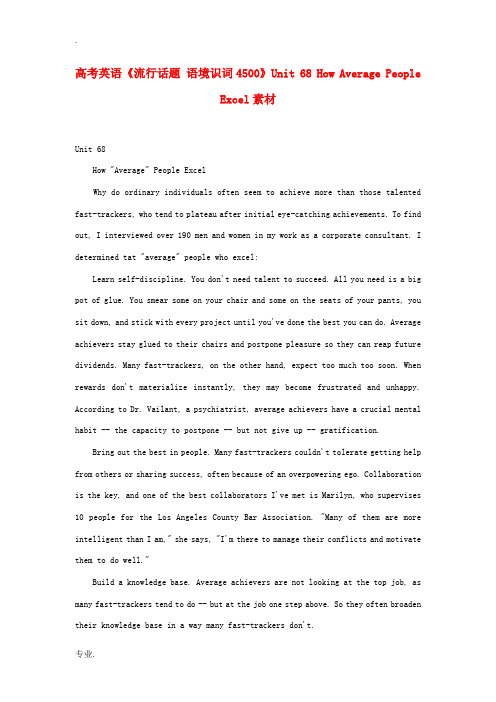
高考英语《流行话题语境识词4500》Unit 68 How Average PeopleExcel素材Unit 68How "Average" People ExcelWhy do ordinary individuals often seem to achieve more than those talented fast-trackers, who tend to plateau after initial eye-catching achievements. To find out, I interviewed over 190 men and women in my work as a corporate consultant. I determined tat "average" people who excel:Learn self-discipline. You don't need talent to succeed. All you need is a big pot of glue. You smear some on your chair and some on the seats of your pants, you sit down, and stick with every project until you've done the best you can do. Average achievers stay glued to their chairs and postpone pleasure so they can reap future dividends. Many fast-trackers, on the other hand, expect too much too soon. When rewards don't materialize instantly, they may become frustrated and unhappy. According to Dr. Vailant, a psychiatrist, average achievers have a crucial mental habit -- the capacity to postpone -- but not give up -- gratification.Bring out the best in people. Many fast-trackers couldn't tolerate getting help from others or sharing success, often because of an overpowering ego. Collaboration is the key, and one of the best collaborators I've met is Marilyn, who supervises 10 people for the Los Angeles County Bar Association. "Many of them are more intelligent than I am," she says, "I'm there to manage their conflicts and motivate them to do well."Build a knowledge base. Average achievers are not looking at the top job, as many fast-trackers tend to do -- but at the job one step above. So they often broaden their knowledge base in a way many fast-trackers don't.Develop special skills. There are at least 7 basic intellectual skills: mathematical, logical, linguistic, musical, spatial, bodily kinesthetic and two types of personal intelligence -- how we understand others, and how we deal with our own dreams, fears and frustrations. So while you may not be good at math, you may have an aptitude for design; or you may have an ability for persuading people.Bounce back from defeat. Sylvia did okay in school, but nothing outstanding. At 42, she joined Revlon as a senior director of marketing. But after only months, she was let go as part of a cutback. A month later, a publishing friend asked for advice on selling advertising to the beauty industry. Two years later, working out of her apartment, Sylvia is now supplying that advice to major clients at roughly the same income she earned at Revlon. She likes being her own boss. "Getting laid off forces you to be creative," she says. "It lights a fire under you."Ultimately, there is nothing more powerful than a person with an average mind who holds his/her head high and goes about life with zest and surety. President Abraham Lincoln could have been destroyed by his seeing ordinariness. He came from a poor background and had ungainly appearance. Instead, he went on to greatness -- while giving new meaning and dignity to what the world considered "average".。
高考英语《流行话题 语境识词4500》Unit 76 Superman Star Christoph

高考英语《流行话题语境识词4500》Unit 76 Superman StarChristopher Reeve素材Unit 76"Superman" Star Christopher ReeveSuperman actor Christopher Reeve, who turned personal tragedy into a public campaign and from his wheelchair became the nation's most recognizable spokesman for spinal cord research, died on Oct. 10, 2004, after suffering cardiac arrest and falling into a a the previous day. In the last week Reeve had developed a serious systemic infection, a mon problem for people living with paralysis who develop bedsores and depend on tubes for their care. "He's put up with a lot", said his mother, "I'm glad he's free of all those tubes."Reeve was born Sept. 25, 1952, in New York City. His athletic frame and love for adventure made him a natural choice for the international icon Superman in the 1987 film. He made Superman believable by playing him as a hero with brains and a heart. He insisted on performing his own stunts. He said, "What makes Superman a hero is not his power, but that he has wisdom and maturity to use the power wisely." Later he co-starred with Jane Seymour in Somewhere in Time, which inspired a wide cult following among college students, though not popular at the time it was released. Seymour thought so highly of Reeve that she named one of her kids after him. Reeve went on to appear in a total of 17 feature films, a dozen TV-movies and 150 plays. His striking good looks and imposing physique were reminiscent of Hollywood's classic leading men like John Wayne who, after meeting Reeve at the 1979 Academy Awards, turned to Cary Grant and said, "This is our new man. He's taking over."On Memorial Day weekend, 1995, Reeve was peting when his horse, "Eastern Express"decided to put on brakes just before the third jump. The momentum carried him over the top of his horse. As his hands got entangled in the bridles, he couldn't get an arm free to break the fall. All his 6-feet-4-inches and 215 pounds landed headfirst. Within seconds, he was paralyzed from the neck down and fighting for air like a drowning person. Enduring months of therapy to allow him to breathe for longer and longer periods without respirator, he emerged to lobby for better insurance protection against catastrophic injury.He also returned to acting in a 1998 production of Rear Window, a modern update of the Hitchcock thriller about a man in a wheelchair who is convinced a neighbor has been murdered. Critics praised his talent and courage, and he was able to municate effectively enough to tell the story by only acting with his voice and face.In 2000, Reeve was able to move his index finger. With rigorous therapy, involving repeated electrical stimulation of the muscles, he also regained sensation in other parts of his body. He vowed to walk again. But sadly, he died 4 years later. Dr. Onders, who implanted electrodes in Reeve's diaphragm in a groundbreaking surgery to help him breathe, said the sore that led to his infection was not Reeve's only recent health problem. "Many different problems develop after nine years of not being able to move yourself, having intestinal problems... It just slowly builds up over the years."。
高考英语《流行话题 语境识词4500》Unit 95 Scientists Look Forward
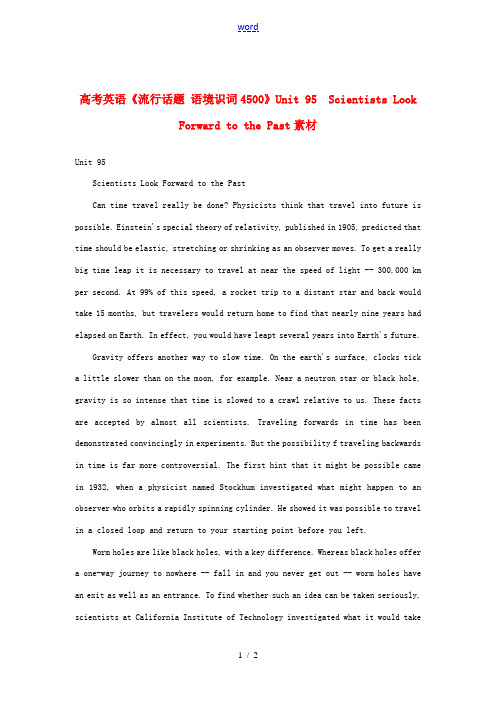
高考英语《流行话题语境识词4500》Unit 95 Scientists LookForward to the Past素材Unit 95Scientists Look Forward to the PastCan time travel really be done? Physicists think that travel into future is possible. Einstein's special theory of relativity, published in 1905, predicted that time should be elastic, stretching or shrinking as an observer moves. To get a really big time leap it is necessary to travel at near the speed of light -- 300,000 km per second. At 99% of this speed, a rocket trip to a distant star and back would take 15 months, but travelers would return home to find that nearly nine years had elapsed on Earth. In effect, you would have leapt several years into Earth's future.Gravity offers another way to slow time. On the earth's surface, clocks tick a little slower than on the moon, for example. Near a neutron star or black hole, gravity is so intense that time is slowed to a crawl relative to us. These facts are accepted by almost all scientists. Traveling forwards in time has been demonstrated convincingly in experiments. But the possibility f traveling backwards in time is far more controversial. The first hint that it might be possible came in 1932, when a physicist named Stockhum investigated what might happen to an observer who orbits a rapidly spinning cylinder. He showed it was possible to travel in a closed loop and return to your starting point before you left.Worm holes are like black holes, with a key difference. Whereas black holes offer a one-way journey to nowhere -- fall in and you never get out -- worm holes have an exit as well as an entrance. To find whether such an idea can be taken seriously, scientists at California Institute of Technology investigated what it would takefor such a short cut though space to exist. They found that if you tried to make a worm hole out of any normal form of matter, it would collapse under its own gravity and turn into a black hole. For a worm hole remain stable, it would have to be made of exotic material that would create an anti-gravity force. Physicists know of peculiar states of matter that generate anti-gravity, and a worm hole is not physically impossible. It dawned on them that such a structure could be adapted to make a time machine that would allow an astronaut to leap instantaneously into both the past and the future. Go through the worm hole one way, and you reach the future. Go through the other way and you e out in the past.Making a worm hole presents formidable engineering challenges, but suppose it could be done, and time travel became a reality? Thorny paradoxes loom. What happens to the time traveler who goes back and murders his mother as a girl? If so, who murdered the mother? Does that mean he was never born? Because the present is linked to the past, you cannot change the past without unleashing causal disorder. Since the purpose of science is to give a rational account of reality, any theory that permits paradoxical consequences is suspect. Does this mean Einstein's theory of relativity is wrong, or that worm holes could never form?Although theoretical investigations of time travel are a popular topic among physicists, there is no consensus on how to handle the ensuing paradoxes. But one thing is agreed. Once a time machine is made, you could visit the year 2100, check out the stock prices, and then pop back and make the right investments to repay the loan.。
高考英语《流行话题 语境识词4500》Unit 65 The Ameri
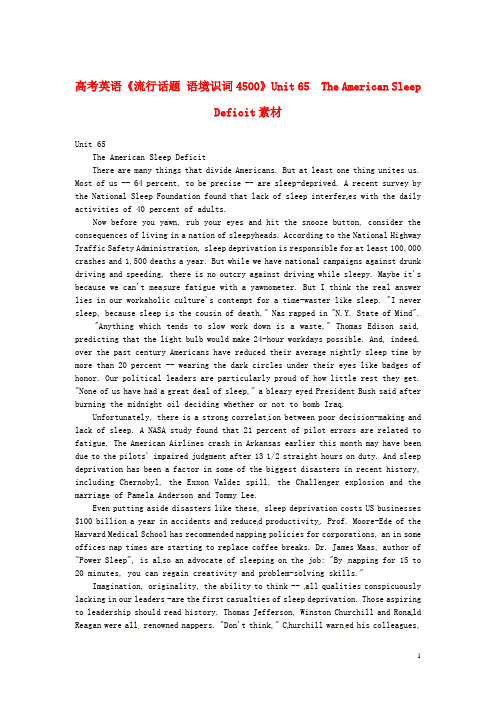
高考英语《流行话题语境识词4500》Unit 65 The American SleepDeficit素材Unit 65The American Sleep DeficitThere are many things that divide Americans. But at least one thing unites us. Most of us -- 64 percent, to be precise -- are sleep-deprived. A recent survey by the National Sleep Foundation found that lack of sleep interfer es with the daily activities of 40 percent of adults.Now before you yawn, rub your eyes and hit the snooze button, consider the consequences of living in a nation of sleepyheads. According to the National Highway Traffic Safety Administration, sleep deprivation is responsible for at least 100,000 crashes and 1,500 deaths a year. But while we have national campaigns against drunk driving and speeding, there is no outcry against driving while sleepy. Maybe it's because we can't measure fatigue with a yawnometer. But I think the real answer lies in our workaholic culture's contempt for a time-waster like sleep. "I never sleep, because sleep i s the cousin of death," Nas rapped in "N.Y. State of Mind"."Anything which tends to slow work down is a waste," Thomas Edison said, predicting that the light bulb would make 24-hour workdays possible. And, indeed, over the past century Americans have reduced their average nightly sleep time by more than 20 percent -- wearing the dark circles under their eyes like badges of honor. Our political leaders are particularly proud of how little rest they get. "None of us have had a great deal of sleep," a bleary eyed President Bush said after burning the midnight oil deciding whether or not to bomb Iraq.Unfortunately, there is a strong correlat ion between poor decision-making and lack of sleep. A NASA study found that 21 percent of pilot errors are related to fatigue. The American Airlines crash in Arkansas earlier this month may have been due to the pilots' impaired judgment after 13 1/2 straight hours on duty. And sleep deprivation has been a factor in some of the biggest disasters in recent history, including Chernobyl, the Exxon Valdez spill, the Challenger explosion and the marriage of Pamela Anderson and Tommy Lee.Even putting aside disasters like these, sleep deprivation costs US businesses $100 billion a year in accidents and reduce d productivity. Prof. Moore-Ede of the Harvard Medical School has recommended napping policies for corporations, an in some offices nap times are starting to replace coffee breaks. Dr. James Maas, author of "Power Sleep", is al so an advocate of sleeping on the job: "By napping for 15 to 20 minutes, you can regain creativity and problem-solving skills."Imagination, originality, the ability to think -- all qualities conspicuously lacking in our leaders -are the first casualties of sleep deprivation. Those aspiring to leadership should read history. Thomas Jefferson, Winston Churchill and Rona ld Reagan were all renowned nappers. "Don't think," C hurchill warn ed his colleagues,"you will be doing less work because you sleep during the day. That's a foolish notion held by people w ho have no imagination. You will be able to accomplish more."Maybe we should spend more time worrying about how many hours our leaders are sleeping rather than whom they are sleeping with. Now that o ur budget is in the black, how about turning our attention to the national sleep deficit?。
高考英语《流行话题 语境识词4500》Unit10 Motorism素材

Unit 10MotorismThe scene is a petrol station somewhere in England. A queue of cars stretches back over a kilometer down the road. As veh icles move slowly to wards the pumps, the air fills with the sound of the car horns. People are getting frustrated and angry. Suddenly a fight starts. Two respectable-looking men in business suits are hitting each other. One has accused the other of jumping the queue. The British petrol crisis started in Sep. 2000, and car owners began panic buying. Many are genuinely worried about being able to get to work. But many more had no need for petrol. They still waitedfor hours to put tiny amounts in the fuel tank. Others wasted their fuel driving from place to place trying to buy more. Soon a serious shortage developed.Things are back to normal now. But the big scare has raised lots of questions about the effectof car culture on society in general. According to sociologists, a motorist is not just a person who uses a car to go from one place to another. He is someone whose attitudes and beliefs are closely linked to the fact that he owns a car. He has a certain way of looking at he world. Call it "motorism".It is a philosophy that can be summed up in two words -- me first.To the committed motorist, the car represents freedom. People without cars have to wait for bus or train. They go where it wants them to go. And they have no choice over who goes with them. The car driver can go exactly where he wants. he can choose the t ime of journey and travel with anyone he likes, or no one at all. When he passes a line of people at a bus stop, he smiles. Heis a different and better human being. He is a car-owner.Gradually, th e car becomes part of his family. The thought that it might go short of petrol affects him in the same way as the thought his child might go hungry. He will do anything or go anywhereto satisfy that hunger. Many car owners do not think like this. They depend on a car for physical reasons. But others become psychologically depe ndent on their cars.Car culture is an accepted part of many Western societies. But the panic buying of petrol in Sep. showed that it would be a dangerous way to think. It is like having a friend who believes he can fly. Everybody laughs, unt il he jumps out of the window.There are signs that people are realizing this. Some of those who queued for hours for petrol nowsay they are a bit a shamed of themselves. Next time they will stop and think. According to the manufacturers, bicycle sales have risen by over 30 percent since the crisis. Some people are atlast trying to break the car habit. Bicycles might be slower and less comfort able than cars. But everyone knows who is in charge.1 / 1。
高考英语《流行话题 语境识词4500》Unit7 The Rules of Game素材
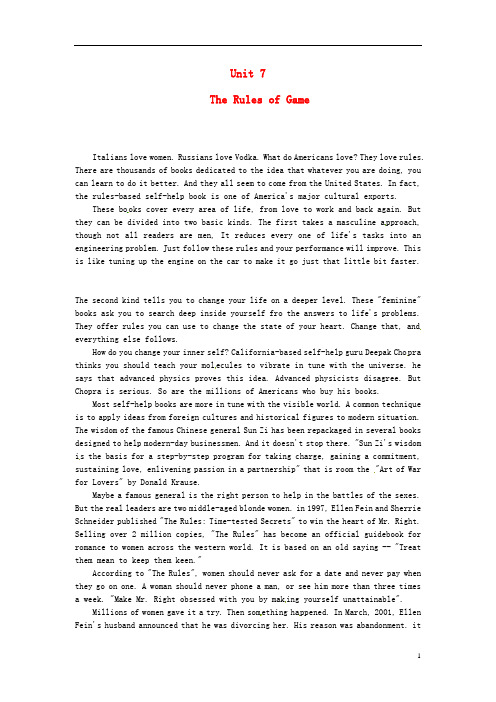
Unit 7The Rules of GameItalians love women. Russians love Vodka. What do Americans love? They love rules. There are thousands of books dedicated to the idea that whatever you are doing, you can learn to do it better. And they all seem to come from the United States. In fact, the rules-based self-help book is one of America's major cultural exports.These bo oks cover every area of life, from love to work and back again. But they can be divided into two basic kinds. The first takes a masculine a pproach, though not all readers are men, It reduces every one of life's tasks into an engineering problem. Just follow these rules and your performance will improve. This is like tuning up the engine on the car to make it go just that little bit faster.The second kind tells you to change your life on a deeper level. These "feminine" books ask you to search deep inside yourself fro the answers to life's problems. They offer rules you can use to change the state of your heart. Change that, and everything else follows.How do you change your inner self? California-based self-help guru Deepak Cho pra thinks you should teach your mol ecules to vibrate in tune with the universe. he says that advanced physics proves this idea. Advanced physicists disagree. But Chopra is serious. So are the millions of Americans who buy his books.Most self-help books are more in tune with the visible world. A common technique is to apply ideas from foreign cultures and historical figures to modern situation. The wisdom of the famous Chinese general Sun Zi has been repackaged in several books designed to help modern-day businessmen. And it doesn't stop there. "Sun Zi's wisdom is the basis for a step-by-step program for taking charge, gaining a commitment, sustaining love, enlivening passion in a partnership" that is room the "Art of War for Lovers" by Donald Krause.Maybe a famous general is the right person to help in the battles of the sexes. But the real leaders are two middle-aged blonde women. in 1997, Ellen Fein and Sherrie Schneider published "The Rules: Time-tested Secrets" to win the heart of Mr. Right. Selling over 2 million copies, "The Rules" has become an official guidebook for romance to women across the western world. It is based on an old saying -- "Treat them mean to keep them keen."According to "The Rules", women should never ask for a date and never pay when they go on one. A woman should never phone a man, or see him more than three times a week. "Make Mr. Right obsessed with you by mak ing yourself unattainable".Millions of women gave it a try. Then som ething happened. In March, 2001, Ellen Fein's husband announced that he was divorcing her. His reason was abandonment. itseems that Mrs. Fein had spent so much time telling other women how to find potential husbands. She had forgotten about her actual husband.The public reacte d with amusement. It's always nice to se e the experts get things wrong. But there is no sign that people have stopped wanting to be told about how to live their lives. Some rules might not work. But "The Rules" go on forever.。
高考英语词汇积累系列:流行话题阅读语境识词4500 nit 94 Managerial tereotype
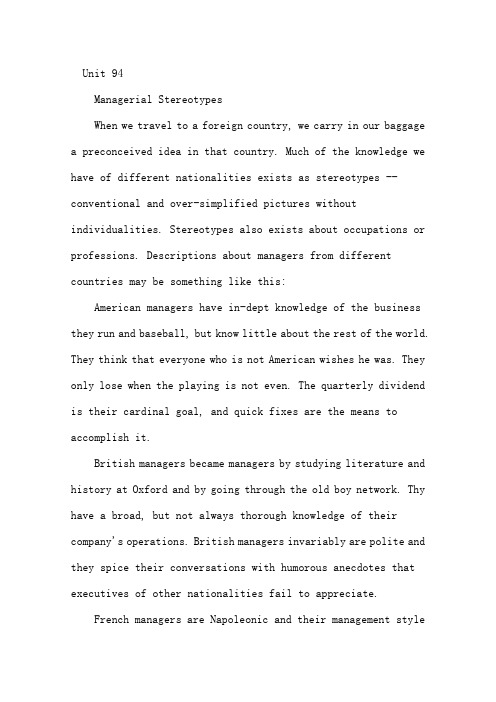
Unit 94Managerial StereotypesWhen we travel to a foreign country, we carry in our baggage a preconceived idea in that country. Much of the knowledge we have of different nationalities exists as stereotypes -- conventional and over-simplified pictures without individualities. Stereotypes also exists about occupations or professions. Descriptions about managers from different countries may be something like this:American managers have in-dept knowledge of the business they run and baseball, but know little about the rest of the world. They think that everyone who is not American wishes he was. They only lose when the playing is not even. The quarterly dividend is their cardinal goal, and quick fixes are the means to accomplish it.British managers became managers by studying literature and history at Oxford and by going through the old boy network. Thy have a broad, but not always thorough knowledge of their company's operations. British managers invariably are polite and they spice their conversations with humorous anecdotes that executives of other nationalities fail to appreciate.French managers are Napoleonic and their management styleis imperial. Stiff hierarchies discourage informal relations and nurture a sense of "them" versus "us". It's difficult to reach the boss. The flow of information always goes one-way: downward. French managers love to talk, though not always about items on the agenda. Their initial response to proposals is always negative just because they like debate.German managers prefer to go by the book. They have years of technical training and high degrees. They are formal and serious. Meetings are conducted with attention to details and they sometimes raise their voice and pound the table to see if they can intimidate the other party into making concessions.Italian managers are flexible, and often ignore company rules. They prefer telephone and personal contact to memos and faxes. Management is paternalistic. Bosses give their employees protection. They, in turn, are loyal and identify with company goals. Informal networks of family and powerful friends matter much in business.Japanese managers say yes when mean no. Rank and social status are important and they are formal and reserved. The main duty of Japanese managers is maintain harmony and motivate subordinates to work for the good of company.Swedish managers are practical, technically capable butunimaginative. They have no sense of humor and take everything you say literally. They often spend more time telling you what's wrong with their products than what's good about them. Swedes dress in sports shirts and slacks for meeting and are neurotic about punctuality.。
高考英语《流行话题 语境识词4500》Unit 73 You Make Mona Lisa Smil
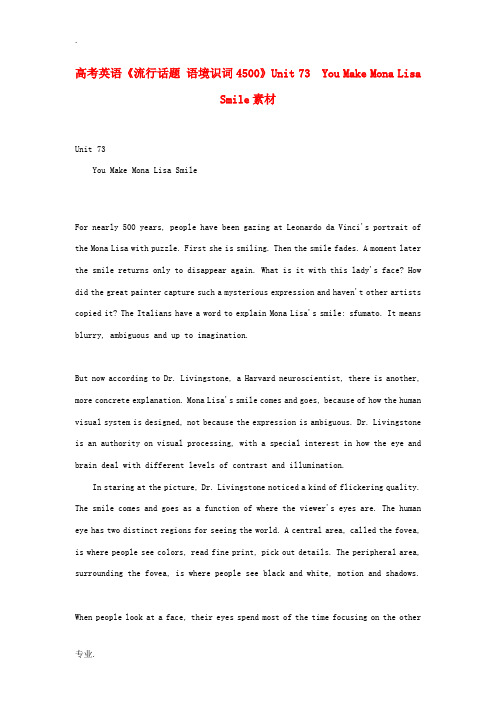
高考英语《流行话题语境识词4500》Unit 73 You Make Mona LisaSmile素材Unit 73You Make Mona Lisa SmileFor nearly 500 years, people have been gazing at Leonardo da Vinci's portrait of the Mona Lisa with puzzle. First she is smiling. Then the smile fades. A moment later the smile returns only to disappear again. What is it with this lady's face? How did the great painter capture such a mysterious expression and haven't other artists copied it? The Italians have a word to explain Mona Lisa's smile: sfumato. It means blurry, ambiguous and up to imagination.But now according to Dr. Livingstone, a Harvard neuroscientist, there is another, more concrete explanation. Mona Lisa's smile comes and goes, because of how the human visual system is designed, not because the expression is ambiguous. Dr. Livingstone is an authority on visual processing, with a special interest in how the eye and brain deal with different levels of contrast and illumination.In staring at the picture, Dr. Livingstone noticed a kind of flickering quality. The smile comes and goes as a function of where the viewer's eyes are. The human eye has two distinct regions for seeing the world. A central area, called the fovea, is where people see colors, read fine print, pick out details. The peripheral area, surrounding the fovea, is where people see black and white, motion and shadows.When people look at a face, their eyes spend most of the time focusing on the otherperson's eyes, thus when a person's center of gaze is on Mona Lisa's eyes, his less accurate peripheral vision is on her mouth. And because peripheral vision is not interested in detail, it readily picks up shadows from Mona Lisa's cheekbones. These shadows suggest and enhance the curvature of a smile. But when the viewer's eyes go directly to Mona Lisa's mouth, his central vision doesn't see the shadows, you'll never be able to catch her smile by looking at her mouth. The flickering quality -- with smile present and smile gone -- occurs as people move their eyes around Mona Lisa's face.The actress Geena Davis also shows the Mona Lisa effect -- always seeming to be smiling, even when she isn't, because her cheek bones are so prominent."I don't mean to take away the mystery of Leonado," Dr. Livingstone said. "He was a genius who captured something from real life that rarely gets noticed in real life. It took the rest of us 500 years to figure out."It is also not clear why other painters have not copied the effect more often. To make a good counterfeit Mona Lisa, one would have to paint the mouth by looking away from it. How anyone can do that remains a mystery.。
高考英语《流行话题 语境识词4500》Unit 78 The American Civil War素
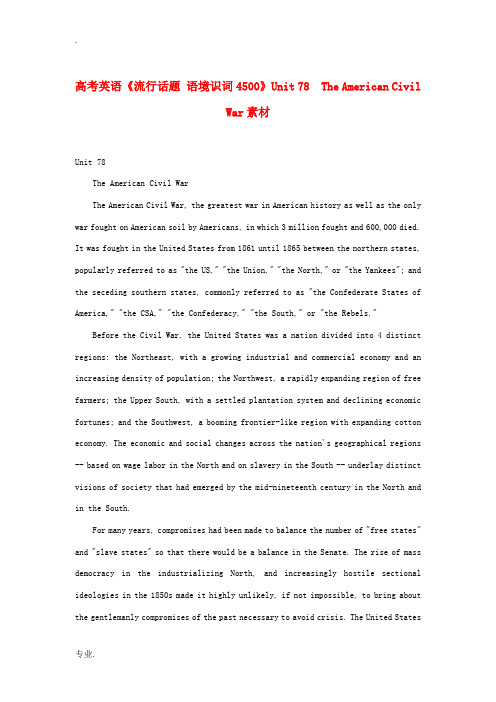
高考英语《流行话题语境识词4500》Unit 78 The American CivilWar素材Unit 78The American Civil WarThe American Civil War, the greatest war in American history as well as the only war fought on American soil by Americans, in which 3 million fought and 600,000 died. It was fought in the United States from 1861 until 1865 between the northern states, popularly referred to as "the US," "the Union," "the North," or "the Yankees"; and the seceding southern states, commonly referred to as "the Confederate States of America," "the CSA," "the Confederacy," "the South," or "the Rebels."Before the Civil War, the United States was a nation divided into 4 distinct regions: the Northeast, with a growing industrial and commercial economy and an increasing density of population; the Northwest, a rapidly expanding region of free farmers; the Upper South, with a settled plantation system and declining economic fortunes; and the Southwest, a booming frontier-like region with expanding cotton economy. The economic and social changes across the nation's geographical regions -- based on wage labor in the North and on slavery in the South -- underlay distinct visions of society that had emerged by the mid-nineteenth century in the North and in the South.For many years, compromises had been made to balance the number of "free states" and "slave states" so that there would be a balance in the Senate. The rise of mass democracy in the industrializing North, and increasingly hostile sectional ideologies in the 1850s made it highly unlikely, if not impossible, to bring about the gentlemanly compromises of the past necessary to avoid crisis. The United StatesRepublican Party was established in 1854. The new party opposed the expansion of slavery in the Western territories. Meanwhile, the profitability of cotton solidified the South's dependence on the plantation system and its foundation: slave labor. A small class of slave barons, especially cotton planters, dominated the politics and society of the South.Lincoln was a moderate in his opposition to slavery. He pledged to do all he could to oppose the expansion of slavery into the territories; but he also said the federal government did not have the power to abolish slavery in the states in which it already existed, and that he would enforce Fugitive Slave Laws. The southern states expected increasing hostility to their "peculiar institution"; not trusting Lincoln, and mindful that many other Republicans were intent on complete abolition of slavery. Seven states seceded shortly after the election of Abraham Lincoln in 1860. They were South Carolina, Mississippi, Florida, Alabama, Georgia, Louisiana, and Texas. These Deep South States, where slavery and cotton plantation agriculture were most dominant, formed the Confederate States of America February 4, 1861, with Jefferson Davis as President of the rebel government. The Civil War began when Confederate General Pierre Beauregard opened fire upon Fort Sumter in Charleston, South Carolina on April 12, 1861.Why the Union won the Civil War has been the subject of extensive debate. Advantages widely believed to have contributed to the Union's success include: the North's strong, industrial economy, the North's strong compatible railroad links, the North's larger population and greater immigration, the North's moral cause (the Emancipation Proclamation) given to the war by Abraham Lincoln mid-way during the war, the recruitment of blacks into the Union Army after the Emancipation Proclamation was approved. Towards the end of the war, the Confederacy relented and began to allow Blacks to enter the Confederate Army, but this action was only a token effort.。
- 1、下载文档前请自行甄别文档内容的完整性,平台不提供额外的编辑、内容补充、找答案等附加服务。
- 2、"仅部分预览"的文档,不可在线预览部分如存在完整性等问题,可反馈申请退款(可完整预览的文档不适用该条件!)。
- 3、如文档侵犯您的权益,请联系客服反馈,我们会尽快为您处理(人工客服工作时间:9:00-18:30)。
高考英语《流行话题语境识词4500》Unit 71 Escape Valve素材
Unit 71
Escape Valve
A man and woman I know moved in togethe r recently. It was, as such occasions are, a moment of sentiment and celebration. It was also a limited engagement. Before moving in, they had already set a fixed date when they would break up. They exp lained their reasons to one and all. In a year, the woman planned to change jobs and cities; the man didn't plan to follow. An eventual split is unfortunate, they said, but also inevitable, so why not plan on it? Yet far from being a sad twist of fate, my woman friend's scheduled departure was a liberating force, making possible whatever short-term romance the couple will enjoy. Without the escape clause of a pre-set termination of their affair, they might never have lived together.
This situation is not unique. More and more people are ordering their lives along a principle I call the "automatic-out". In love, friendship, work, and the community, people increasingly prefer arrangements that automatically end at some pre-s et date. It is a force in society as a whole, as more of us hunger for lives that appear stable and deep-rooted but lack the complications of comm itment.
Automatic-out may have its foundations in the preset cycles of academic life. In recent decades, an ever-higher per centage of the population has been able to attend college and post-graduate schools. That's a good thing for the c ause of education but perhaps not so good for society's spirit. Longtime students learn to view institutions as places where people briefly come to rest, and from which they will be automatically removed on a date known years in advance. They also tend to see institutions as a means by which to take things for themselves, instead of adding things for others.
So it ma y be no surprise that professionals -- usually the beneficiaries of advanced schooling -- seem increasingly uninterested in staying put. A Brookings Institution study sho ws that Government-agency managers turn over, on average, every 21 months. Now it is becoming true of private enterpris es as well. According to the Conference Board, a business research organization, top corporate executives now switch jobs every 4.5 years on average.
The job-switching mania, it is sometimes suggested, stems from a combination of boredom and ex pectations of promotion. But I think it is motivated b the desire for automatic-out. When you know in advance that you will soon be changing jobs, you are relieved of concern for the overall integrity of your institution whether the quality of its products, the fairness of its service, the odds of its survival. You have a built-in excuse for selfishness ("I'll be leaving in a year anyway") and can concentrate on advancing yourself, secure in the knowledge that if you fail to improve your organization, you personally won't suffer. You'll be one step ahead of the crumbling wall. It seems to be the same in love. If a romance operates under some per-set restriction, neither partner feels obliged to sacrifice his interests
for joint interests. Why sacrifice for something not expected to last long anyway? Thus, the shot-term benefits of marriage and living together (companionship, warmth, convenience) remain popular. But long-term obligation to the institution of marriage has fallen into disrepute among many young people. Children and family life are especially in disrepute today, for whenever children are present there is no easy way out, emotionally and legally. The weekend romance is especially desirable today, not because people move around more now but because distance guarantees an automatic-out.。
